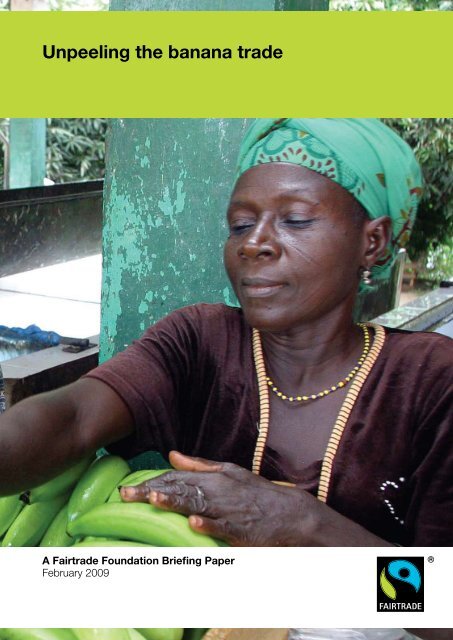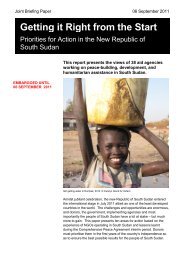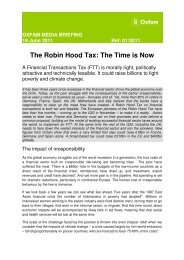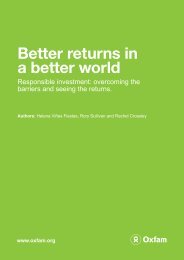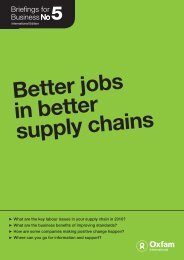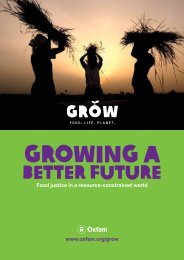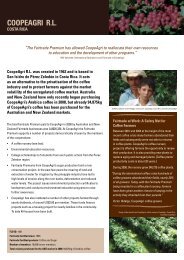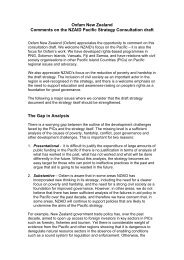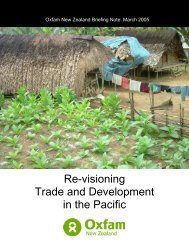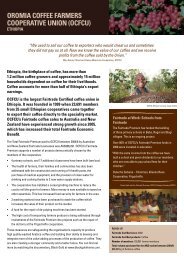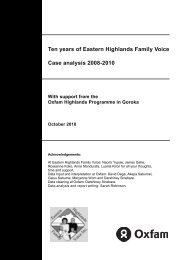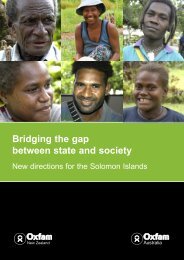Bananas: Unpeeling the Banana Trade - The Fairtrade Foundation
Bananas: Unpeeling the Banana Trade - The Fairtrade Foundation
Bananas: Unpeeling the Banana Trade - The Fairtrade Foundation
Create successful ePaper yourself
Turn your PDF publications into a flip-book with our unique Google optimized e-Paper software.
<strong>Unpeeling</strong> <strong>the</strong> banana tradeA <strong>Fairtrade</strong> <strong>Foundation</strong> Briefing PaperFebruary 2009
<strong>Banana</strong> facts• <strong>The</strong> banana is <strong>the</strong> most popular fruit in <strong>the</strong> world – shoppersspend more than £10 billion a year on <strong>the</strong> fruit globally 1• <strong>Fairtrade</strong> bananas now account for nearly 2% of <strong>the</strong> total worldtrade in fresh bananas• <strong><strong>Banana</strong>s</strong> are <strong>the</strong> world’s fourth most important crop after rice,wheat and maize in terms of ensuring food security in dozensof countries in <strong>the</strong> developing world 2• Just 15% of bananas and plantains are traded on <strong>the</strong> worldmarket, <strong>the</strong> rest are used for domestic consumption 3• Production and trade in bananas is dominated by five companies– Chiquita, Dole, Del Monte, Noboa and Fyffes – which controlmore than 80% of global trade 4• <strong>The</strong> majority of banana plantation workers do not earn enoughto provide for <strong>the</strong>ir families – some earn less than £1 a day• Between 2002 and 2008, supermarket price wars saw <strong>the</strong> UKretail price of loose bananas slashed by up to 41%• In 2008, one in every four bananas sold in <strong>the</strong> UK was <strong>Fairtrade</strong>• In 2008, <strong>the</strong> value of <strong>the</strong> UK <strong>Fairtrade</strong> banana market was£150 million• <strong>The</strong> UK banana industry as a whole is worth £580million annually• <strong><strong>Banana</strong>s</strong> are <strong>the</strong> third most valuable product sold in UKsupermarkets – only petrol and lottery tickets out sell <strong>the</strong>m• Between 2000 and 2008, <strong>Fairtrade</strong> certified producer groupsand <strong>the</strong>ir communities received around $28 million in <strong>Fairtrade</strong>premiums just from <strong>the</strong> UK sales of <strong>Fairtrade</strong> bananas1Calculation by <strong>Banana</strong> Link on basis of FAO trade statistics 20052FAO figures3Ibid.4FAO/UNCTAD figures
Executive summary<strong>The</strong> banana: cheap, colourful and <strong>the</strong> UK’s firm favourite in <strong>the</strong> fruit department. But delve into<strong>the</strong> reality behind <strong>the</strong> piles of yellow fruit on our supermarket shelves and <strong>the</strong> story is not always sosunny. This briefing sets out to explain why we all need to go fur<strong>the</strong>r and make <strong>Fairtrade</strong> bananas<strong>the</strong> norm in our shops and supermarkets. It explains why <strong>the</strong> situation for so many bananaproducers remains so precarious, describes <strong>the</strong> impact that <strong>Fairtrade</strong> has had in <strong>the</strong> bananasector so far and identifies what more can be done to support those at <strong>the</strong> bottom of <strong>the</strong> bananasupply chain.Nine years on from <strong>the</strong>ir launch, <strong>the</strong> success of <strong>Fairtrade</strong> bananas in <strong>the</strong> UK market isremarkable. With one banana in every four sold in <strong>the</strong> UK now carrying <strong>the</strong> FAIRTRADE Mark,<strong>the</strong>y are rapidly becoming part of <strong>the</strong> nation’s everyday shop. With this growth has come positivechange to <strong>the</strong> lives of thousands of banana farmers and plantation workers. But <strong>the</strong> damagingtrends of production and trade that made <strong>the</strong> introduction of <strong>Fairtrade</strong> so vital still dominate <strong>the</strong>global banana industry.As bananas have become increasingly popular, retail prices have dropped significantly, forcingprices down across <strong>the</strong> entire supply chain in a race to <strong>the</strong> bottom. This pressure inevitably resultsin lower wages, longer hours and worsening working conditions for many plantation workers whoare often paid pittance wages – less than £1 a day in some cases – not enough to provide for <strong>the</strong>irfamilies. <strong>The</strong>y are very often prevented from forming trade unions to protect <strong>the</strong>ir rights and improve<strong>the</strong>ir situation. <strong>The</strong> increasing use of casual and sub-contracted labour results in fur<strong>the</strong>r abuses ofworkers’ rights.<strong>The</strong> picture for small-scale banana farmers is no better. New EU agreements in response to WTOrulings, coupled with devastating storms, have spelt disaster for small farmers in <strong>the</strong> Caribbean. In<strong>the</strong> Windward Islands more than 20,000 of 25,000 farmers have gone out of business since 1992and more farmers lose <strong>the</strong>ir livelihoods in Ecuador, Jamaica and o<strong>the</strong>r countries each time <strong>the</strong> price<strong>the</strong>y receive for <strong>the</strong>ir bananas falls below <strong>the</strong> cost of production. <strong>Fairtrade</strong> has provided a lifeline for<strong>the</strong>se farmers – 85% of <strong>the</strong> surviving farmers in <strong>the</strong> Windwards are now certified <strong>Fairtrade</strong> – howeverongoing trade reforms remain a serious threat.<strong>The</strong> success of <strong>Fairtrade</strong> bananas can be attributed to UK consumers’ engagement with <strong>the</strong>problems facing small-scale banana farmers and plantation workers, <strong>the</strong>ir corresponding pressureupon supermarkets to stock <strong>Fairtrade</strong> alternatives and <strong>the</strong>ir commitment to buying <strong>Fairtrade</strong>bananas on a regular basis.But, just as bananas symbolise <strong>the</strong> success of <strong>the</strong> <strong>Fairtrade</strong> movement so far, <strong>the</strong>y also clearlyillustrate <strong>the</strong> challenges that still lie ahead. Nine years of <strong>Fairtrade</strong> bananas in <strong>the</strong> UK have broughtbenefits to producers, but <strong>the</strong>y are still vulnerable to food and fuel price rises, climate change andever more stringent demands from retailers. As well as scaling up <strong>the</strong> reach and impact of <strong>Fairtrade</strong>in <strong>the</strong> banana industry we need to create an international economic system in which trade not onlyhelps to eliminate poverty but also empowers people to take <strong>the</strong>ir future into <strong>the</strong>ir own hands.page 1 <strong>Unpeeling</strong> <strong>the</strong> banana trade
1.<strong>The</strong> changing supplyof UK bananas21514610371164132019 18151217112981.1 <strong>The</strong> traditional playersBefore 1993, historical UK trading relationships meant thatmost Caribbean bananas were guaranteed a market inBritain. Most of Britain’s bananas came from St Lucia, StVincent, Dominica and Grenada (collectively <strong>the</strong> WindwardIslands), as well as Jamaica, Belize and Surinam.<strong>The</strong> advent of <strong>the</strong> Single European Market caused aradical shift in supply as <strong>the</strong> various national tradingarrangements were harmonised under a single importsystem. As <strong>the</strong> European market has become moreopen, retailers have started to source more directly fromproducers, inevitably choosing lower-cost suppliers,resulting in bananas from Latin American plantationsand now West Africa replacing higher-cost onesfrom traditional Caribbean smallholders.Between 1992 and 2007, UK banana imports increasedfrom 545,000 tonnes to 927,000 tonnes, a growth of41%. In <strong>the</strong> same period, imports from Caribbeancountries fell from 70% to less than 30% of imports.Cheaper Latin American ‘dollar’ bananas, almostinsignificant in 1992, now make up around half of UKimports, with Costa Rica <strong>the</strong> UK’s biggest banana supplieraccounting for 25% of total imports in 2007.Caribbean producers remain almost entirely dependent onUK sales and so <strong>the</strong>ir falling share of <strong>the</strong> UK market hashad a devastating effect. Dominica, St Vincent andSt Lucia have lost more than 20,000 of <strong>the</strong>ir 25,000small-scale banana growers since 1992. <strong>The</strong>re are nowless than 4,000 small farmers remaining of which over3,500 are <strong>Fairtrade</strong> certified. 5O<strong>the</strong>r countries1 Ecuador2 Philippines3 Costa Rica4 Colombia5 Guatemala6 Honduras7 Panama8 Brazil9 Peru10 Nicaragua240,000220,000200,000180,000160,000140,000120,000100,00080,00060,00040,00020,0000Volume(tonnes)19922007ACP11 Cameroon12 Ivory Coast13 Dominican Republic14 Belize15 Surinam16 Jamaica17 Ghana18 Windward IslandsUK banana imports by principal countries(1992 and 2007)DominicaSt LuciaSt VincentBelizeCameroonCountrySource: DEFRA 2008DominicanRepublicIvory CoastJamaicaSurinamGrenadaColombiaCosta RicaEcuadorEU19 Martinique20 Guadeloupe21 Canary IslandsGuatemalaHondurasPanamaVenezuelaFranceO<strong>the</strong>r EUpage 2 <strong>Unpeeling</strong> <strong>the</strong> banana trade
In response to growing consumer demand for <strong>Fairtrade</strong>and/or organic bananas, countries such as <strong>the</strong> DominicanRepublic and Colombia, which have substantial volumesof both, have grown in importance as suppliers.<strong>The</strong> leading companies importing bananas into <strong>the</strong> UKinclude four multinationals: Chiquita, Dole/JP Fruit, Fyffes,and Del Monte; and three independents: SH Pratt, MackMultiples and Windwards <strong><strong>Banana</strong>s</strong>. <strong>The</strong>se samecompanies also ripen and distribute <strong>the</strong> fruit. Althoughmarket share figures change rapidly with changes in retailsupply chains, <strong>the</strong>y all have a market share of between10% and 20%, except Windwards <strong><strong>Banana</strong>s</strong>(approximately 6%). Toge<strong>the</strong>r <strong>the</strong>se companies controlover 98% of <strong>the</strong> UK market. 61.2 <strong>The</strong> new arrivalsIn 2006, around 81 million tonnes of bananas wereproduced around <strong>the</strong> world, of which 17 million tonneswere exported. 7 Traditional banana exporting countriesare facing fur<strong>the</strong>r challenges in <strong>the</strong> form of major newproducing countries entering <strong>the</strong> market with <strong>the</strong> potentialto reshape <strong>the</strong> world banana economy. <strong>The</strong> world’s twolargest banana-producing countries – India and Brazil –toge<strong>the</strong>r grow almost double <strong>the</strong> volume that is tradedworldwide but currently consume <strong>the</strong> majority of thisdomestically. In India, three state governments – Gujarat,Maharashtra and Kerala – are all actively encouragingfarmers to upgrade <strong>the</strong>ir technology and enter <strong>the</strong> exportmarket. At this stage, <strong>the</strong>re have only been trial shipmentsto Middle Eastern markets, but if <strong>the</strong> Indian initiativesgo ahead, this will have a global impact. Indeed aspokesman for <strong>the</strong> Indian fruit exporter Tata Chemicalsrecently predicted that ‘India, in <strong>the</strong> next five to ten years,will [become <strong>the</strong> world’s] largest grape and bananaexporter so <strong>the</strong>re is big potential in <strong>the</strong> business.’ 8Brazil’s exports to its Sou<strong>the</strong>rn neighbours and toEurope have grown rapidly this millennium, reachingaround 250,000 tonnes a year.In Africa, <strong>the</strong> promise of zero tariff entry to <strong>the</strong> EU becauseof some countries’ Least Developed Country’ status hasattracted fruit company investment. In Ghana, Dolestarted exporting from new plantations in 2006, whileChiquita has tested new varieties in Côte d’Ivoire, withplanting of crops for export now underway. Chiquitatechnicians have also acquired land on <strong>the</strong> coastalplains of Angola, a country which has neverpreviously been involved in banana exports. 9<strong>The</strong> development of new banana companies with acapacity to move into o<strong>the</strong>r markets is also a challengeto <strong>the</strong> dominance of <strong>the</strong> established companies. JFC, <strong>the</strong>biggest of <strong>the</strong> new Russian companies, not only importsEcuadorian bananas for <strong>the</strong> Russian market, but hasinvested in its own plantations, in shipping and in a retailchain, making it <strong>the</strong> world’s first fully ‘vertically integrated’fruit company, with ownership of <strong>the</strong> entire supply chain.1.3 <strong>Fairtrade</strong> in <strong>the</strong> UK marketFollowing several years of hard work to put <strong>Fairtrade</strong>structures in place, <strong>the</strong> Windward Islands shipped <strong>the</strong>first ever <strong>Fairtrade</strong> bananas to <strong>the</strong> UK in 2000. <strong>The</strong> overallmarket has grown from 5,500 tonnes that year to 158,000tonnes in 2007. Driven by <strong>the</strong> commitment of Sainsbury’sand Waitrose to convert to 100% <strong>Fairtrade</strong> bananas, salesare on track to reach 193,000 tonnes for 2008, an overallgrowth of 3,400%. To meet this growing demand, 63producer organisations from eight countries (Ghana,Ecuador, Peru, Colombia, Windward Islands, Costa Rica,Jamaica and <strong>the</strong> Dominican Republic) have now beencertified, with 42 of <strong>the</strong>m supplying <strong>Fairtrade</strong> bananasto <strong>the</strong> UK.350300250200150100500Value(£000)Growth of <strong>the</strong> UK <strong>Fairtrade</strong> banana market (by value)(2000-2007)1999Year200020012002Sources: DEFRA and <strong>Fairtrade</strong> <strong>Foundation</strong>Conventional<strong>Fairtrade</strong><strong>The</strong> initial success of <strong>Fairtrade</strong> bananas owes much todedicated <strong>Fairtrade</strong> companies like <strong>the</strong> Dutch pioneerAgrofair which imported <strong>the</strong> world’s first <strong>Fairtrade</strong> bananasinto Europe in 1996. It is co-owned by <strong>the</strong> farmers whogrow <strong>the</strong> fruit it imports and markets exclusively <strong>Fairtrade</strong>fruit and juices, having now expanded into mangoes,citrus fruits and pineapples.200320042005200620075Communication from Windwards <strong><strong>Banana</strong>s</strong>.6Information compiled by <strong>Banana</strong> Link from trade sources.7United Nations Food and Agriculture Organization.8Freshinfo News. Saturday 10 January 2009.9Communication from <strong>Banana</strong> Link.page 3 <strong>Unpeeling</strong> <strong>the</strong> banana trade
2.<strong>Banana</strong> trade wars<strong>The</strong> European Union is a hugely significant player in <strong>the</strong>world banana trade, importing about a third of all tradedbananas – about <strong>the</strong> same amount as North America –and more than three times that of Japan and Russia, <strong>the</strong>third and fourth biggest importers. EU policies <strong>the</strong>reforehave a major impact on <strong>the</strong> world trade in bananas. While<strong>the</strong> EU banana import system of quotas and tariffs hasbeen at <strong>the</strong> centre of global trade disputes, reformsintroduced on 1 January 2006 have drastically reduced<strong>the</strong> level of market intervention.2.1 <strong>The</strong> story so far<strong>The</strong> formation of <strong>the</strong> Single European Market in 1992meant that <strong>the</strong> European Union had to consolidate <strong>the</strong>various tariff and quota arrangements across Europeancountries for <strong>the</strong> importation of bananas. 10 Followinglengthy debates, a system of both quotas and tariffs wasadopted in July 1993.<strong>The</strong> EU arrangements however were non-compliant withWorld <strong>Trade</strong> Organization (WTO) rules which promotetrade liberalisation by removing trade barriers such asquotas, tariffs, and subsidies. Latin American bananaexporting countries and <strong>the</strong> USA lodged a series of legalchallenges at <strong>the</strong> WTO claiming that <strong>the</strong> EU regimediscriminated against Latin American producers andhampered <strong>the</strong> expansion of, mainly US, multinationalcompanies.In response, <strong>the</strong> EU agreed to end <strong>the</strong> quota systemand introduce a single tariff for all banana imports. As aninterim measure, <strong>the</strong> WTO agreed that <strong>the</strong> EU could waive<strong>the</strong> single tariff and continue tariff-free entry for bananasfrom African, Caribbean and Pacific (ACP) countries inorder to honour long-term commitments that would endin 2008. 11<strong>The</strong> crux of <strong>the</strong> argument regarding <strong>the</strong> tariff was thatLatin American governments and companies wantedto ensure that <strong>the</strong> single tariff was set at a level <strong>the</strong>ybelieved would be low enough to make it remunerativefor <strong>the</strong>ir businesses. However small farmers’organisations, plantation workers’ unions and manyNGOs argued that by simply removing quotas and usingtariffs, <strong>the</strong> market would be flooded with cheaperbananas, pushing import prices down, threateningmillions of livelihoods as multinational banana companiesabandoned higher-cost producing countries in searchof cheaper production. On top of that, if <strong>the</strong> tariff wasfixed too low, higher-cost producers like <strong>the</strong> smallfarmers of <strong>the</strong> Windward Islands were under threat ofbeing squeezed out of <strong>the</strong> market altoge<strong>the</strong>r.Following multiple rounds of consultation and debate <strong>the</strong>EU eventually implemented in 2006 a single tariff ofg176/tonne which in effect only applied to LatinAmerican imports as duty-free entry for ACP imports wasmaintained for a volume which effectively covered all <strong>the</strong>irEU exports. As predicted, since 2006 import volumesfrom both Latin America and West Africa have grownwhile prices inside <strong>the</strong> EU fell and, as feared, price-cuttingby major European retailers is fur<strong>the</strong>r squeezing <strong>the</strong> payand conditions of plantation workers at <strong>the</strong> bottom of <strong>the</strong>banana supply chain. 12However <strong>the</strong> matter didn’t end <strong>the</strong>re. In 2007, Ecuadorand Colombia lodged complaints that <strong>the</strong> EU reformshad hit <strong>the</strong>ir EU banana sales and <strong>the</strong> US againcomplained that duty-free access for ACP countries wasdiscriminatory. <strong>The</strong> EU protested that <strong>the</strong> US action wouldonly damage ongoing talks with all parties, includingnegotiations with ACP governments to sign newEconomic Partnership Agreements (EPAs) that wouldresolve <strong>the</strong>se issues.EU and Latin American ministers were on <strong>the</strong> verge ofsigning a historic breakthrough deal at <strong>the</strong> WTO DohaRound meeting in Geneva in July 2008 that would seeincremental cuts in <strong>the</strong> tariff. This could spell <strong>the</strong> end of<strong>the</strong> banana export industry for Caribbean growers, buthaving run out of options, <strong>the</strong> ACP group accepted <strong>the</strong>deal on <strong>the</strong> understanding that it came with additionaldevelopment aid to restructure remaining industries andassist those forced out of business. However <strong>the</strong> deal fellthrough amidst <strong>the</strong> collapse of wider trade negotiationsto slash tariffs and subsidies for farm products.A prospective meeting for December 2008 failed tomaterialise so whe<strong>the</strong>r or not trade ministers can reachagreement on <strong>the</strong> Doha Round in 2009 – includingreviving <strong>the</strong> deal on bananas – now remains tobe seen.10Import tariffs are taxes imposed on internationally traded goods whilst quotas limit <strong>the</strong> volume of goods that can be imported.11ACP countries are <strong>the</strong> 46 African, Caribbean and Pacific countries that are signatories of <strong>the</strong> Cotonou agreement with <strong>the</strong> European Union.12According to EUROSTAT figures, imports of <strong>the</strong> big four Latin American exporting countries taken toge<strong>the</strong>r rose by 9% from 2005 to 2006, although Ecuador’svolume fell; West African exports rose by over 15%.page 4 <strong>Unpeeling</strong> <strong>the</strong> banana trade
<strong>Banana</strong> wars: a timeline1992 Formation of a single European market1993 Harmonisation of banana import arrangements into <strong>the</strong> EU using a tariff and quotasystem which maintains preferential treatment for ACP countries1993 <strong>The</strong> US, Honduras, Guatemala, Ecuador, Panama and Mexico lodge complaint at GATT 13(predecessor of <strong>the</strong> WTO)2001 EU agrees to end preferential access arrangements and put in place single tariff by 2006which continues to deliver existing protection and market access until 20082004 EU announces tariff negotiations will begin at g230/tonne2005 EU finally agrees a single tariff of g176/tonne2006 New single tariff regime implemented2007 Ecuador and Colombia lodge complaints at WTO that new regime is discriminatory2008 (Jul) Breakthrough banana deal agreed which would see incremental cuts in tariff to g114/tonneby 2016 but WTO Doha Round negotiations in Geneva collapse along with banana deal2008 (Nov) WTO rejects EU appeal against its decision that EU banana regime is inconsistentwith global trade rules2.2 What role EPAs?In parallel talks starting in 2002, <strong>the</strong> EU and ACPgovernments have been negotiating regional EPAs toreplace <strong>the</strong> trade sections of <strong>the</strong> Cotonou and Loméagreements that date back to 1975 and which enshrine<strong>the</strong> preferential treatment for ACP imports.<strong>The</strong> EPAs are intended to put in place new free tradedeals that are compatible with WTO rules from <strong>the</strong> outset.Under WTO rules, trade deals must open up ‘substantiallyall trade’ between partners but <strong>the</strong>y also allow for <strong>the</strong>gradual opening up of markets for sensitive and emergingACP country industries.However, <strong>the</strong> EU has been accused by NGOs, civilsociety groups, think tanks and prominent academics ofusing bullying tactics to push through an aggressive tradestrategy with ACP countries that goes beyond WTOrequirements and forces <strong>the</strong>m to open up <strong>the</strong>ir marketsin a way that could be disastrous for local economiesand <strong>the</strong> livelihoods of millions of people. So far only <strong>the</strong>Caribbean regional grouping has officially signeda ‘comprehensive’ EPA (covering goods and servicesand investment) but, with indications of a change ofnegotiating style on <strong>the</strong>ir part, <strong>the</strong> EU hopes to concludenegotiations with all ACP countries by <strong>the</strong> end of 2009.Never<strong>the</strong>less, significant concerns remain about <strong>the</strong> termsof <strong>the</strong> agreements currently on <strong>the</strong> table and who willbenefit most.13<strong>The</strong> General Agreement on Tariffs and <strong>Trade</strong> whose main objective was <strong>the</strong> reduction of barriers to trade.page 5 <strong>Unpeeling</strong> <strong>the</strong> banana trade
3.<strong>Banana</strong> price wars<strong><strong>Banana</strong>s</strong> occupy a unique position in <strong>the</strong> shopping basketof <strong>the</strong> British consumer. After petrol and National Lotterytickets, <strong>the</strong>y are <strong>the</strong> third most valuable of all productssold by <strong>the</strong> major supermarkets. Like o<strong>the</strong>r staplessuch as bread, milk and baked beans, price-consciousconsumers are likely to know how much bananas costand to use <strong>the</strong>m to judge <strong>the</strong> relative value for moneyoffered by <strong>the</strong> different supermarket chains for o<strong>the</strong>rproducts. 14 This means that <strong>the</strong>se products areparticularly vulnerable to being used in price-cuttingbattles between supermarkets in <strong>the</strong> competition to win<strong>the</strong> hearts and purses of <strong>the</strong> UK shopper. In recent yearsshort-term price-cutting has been a regular feature ofspring marketing strategies designed to increase marketshare by enticing non-regular customers through<strong>the</strong> door. 15As a result of <strong>the</strong> series of price wars between <strong>the</strong> majorsupermarkets, <strong>the</strong> retail price of conventional loosebananas fell by a full 41%, from £1.10 a kilo to 64p,between 2002 and 2007 (although <strong>the</strong>y had increasedto around 95p by <strong>the</strong> end of 2008). Recent reports haveindicated that <strong>the</strong> global financial crisis and higher fruit andshipping costs will increase <strong>the</strong> price of bananas to <strong>the</strong>supermarkets, 16 however in January 2009 ano<strong>the</strong>r leadingsupermarket had slashed prices again to 82p per kilo. 17Contrary to popular belief however, <strong>the</strong> evidence indicatesthat sales of bananas do not rise during price promotionsand seems to confirm that price cuts are not driven byconsumer demand for cheaper bananas.1.151.101.051.000.950.900.850.800.750.700.65Price(£/Kg)Average weekly UK retail price of bananas*(2000-2008)Jan-00Jan-01Jan-02Jan-03Year*<strong>The</strong> average weekly retail price of bananas at Tesco, Sainsbury’s, Somerfield, Morrisons, Safeway/ASDASource: FyffesJan-04Unless supermarkets absorb price cuts within <strong>the</strong>ir ownprofit margins (which <strong>the</strong>y occasionally do), any drop inretail prices inevitably gets passed down <strong>the</strong> supply chain.This means that ultimately <strong>the</strong>re is just not enough moneyreaching countries of origin to provide decent livelihoods,wages and working conditions. 18 <strong>The</strong> impacts of this raceto <strong>the</strong> bottom upon <strong>the</strong> banana producers and workersat <strong>the</strong> bottom of <strong>the</strong> supply chain are described in moredetail below.Jan-05Jan-06Jan-07Jan-084.<strong>The</strong> producers<strong>The</strong>re are two main models of banana production forinternational export: small-scale farms and plantations.<strong>Fairtrade</strong> labelling was set up in <strong>the</strong> late 1980s to increasemarket access for small-scale farmers (at <strong>the</strong> bottomof <strong>the</strong> supply chain) who were struggling to surviveamid tumbling prices and uncertainties related toliberalisation of agricultural commodities. Since <strong>the</strong>n<strong>Fairtrade</strong> has been extended to commercial farmenterprises as a means of increasing <strong>the</strong> empowermentand well-being of <strong>the</strong>ir workers.4.1 Small farmers – surviving against <strong>the</strong> oddsSmallholders are independent family farmers who usemainly family labour. In <strong>the</strong> case of bananas, <strong>the</strong>y generallyemploy one or two permanent workers and bring in casuallabour for <strong>the</strong> fortnightly harvest.<strong>The</strong> vast majority of family farmers who have survived in<strong>the</strong> international banana trade are in <strong>the</strong> Caribbean. <strong>The</strong>only countries where family farms dominate <strong>the</strong> bananaexport economy are Dominica, St Vincent and St Luciain <strong>the</strong> Windward Islands. Small-scale farmers are alwaysat a disadvantage in terms of economies of scale, but withbananas this is exacerbated by <strong>the</strong> fruit’s highly perishablenature. Losing one consignment to hurricanes or diseasewon’t necessarily pose a risk to a large plantation, but canbe enough to knock a small farm out of business. Thisvulnerability also makes <strong>the</strong>m less attractive to buyerswho need to ensure year-round consistency of supply.For farmers in <strong>the</strong> Caribbean, <strong>the</strong> geography of <strong>the</strong>irislands also works against <strong>the</strong>m. Growing areas aremountainous, with poor soil conditions and low yields.14<strong>Banana</strong> Link. ‘Collateral Damage: How price wars between supermarkets helped to destroy livelihoods in <strong>the</strong> banana and pineapple supply chain.’ November 2006.15<strong>The</strong> Grocer.16Freshinfo News. Saturday 10 January 2009.17Daily Mirror. 14 January 2009.18<strong>Banana</strong> Link. ‘Collateral Damage: How price wars between supermarkets helped to destroy livelihoods in <strong>the</strong> banana and pineapple supply chain.’ November 2006.page 6 <strong>Unpeeling</strong> <strong>the</strong> banana trade
Higher shipping, distribution and labour costs allcontribute to a much higher overall production cost thanLatin American plantation production. Small farmers arealso less able to respond to increasing demands forstandardised fruit quality and large volumes. More andmore retailers also require technical quality standardssuch as GLOBALGAP 19 from all <strong>the</strong>ir suppliers and smallproducers have limited capital to invest in meeting <strong>the</strong>seneeds. Hurricanes and flooding are frequent in <strong>the</strong>Caribbean. For smallholders, losing a crop to <strong>the</strong> wea<strong>the</strong>rcan be disastrous and it can take several months beforeany fruit can be harvested again. Substantial outlay isrequired to buy more banana plants. Without o<strong>the</strong>r cropsto fall back on, or savings to shoulder <strong>the</strong> extra cost andfeed a family while business is poor, <strong>the</strong> situationis desperate. This too has knock-on effects on <strong>the</strong> localeconomy.<strong>Fairtrade</strong> is unique because at its heartlies <strong>the</strong> need of small-scale producersfor market access under fair tradingconditions. No o<strong>the</strong>r ethical trade initiativeaddresses <strong>the</strong> problems faced byfamily-based producers working at <strong>the</strong> farend of global supply chains over which<strong>the</strong>y have virtually no influence, but inwhich decisions are made that can affect<strong>the</strong>ir whole lives.In Colombia and Ecuador small farmers are treated byexporters as a kind of buffer supply – <strong>the</strong>ir fruit is indemand when <strong>the</strong> market is in short supply; but when <strong>the</strong>market is oversupplied <strong>the</strong>y are forced to accept pricesbelow <strong>the</strong>ir costs of production or are simply unable tosell at all. <strong>The</strong> response of many small growers in SouthAmerica and <strong>the</strong> Caribbean has been to come toge<strong>the</strong>rin associations and co-operatives (which enables <strong>the</strong>m toshare costs, market information and technical support) inorder to supply higher value speciality markets such as <strong>the</strong>organic and/or <strong>Fairtrade</strong> markets. This is a very positivedevelopment, but it has not prevented many thousands ofsmall-scale banana farmers from losing <strong>the</strong>ir livelihoods.In Ecuador, every time <strong>the</strong> price falls below <strong>the</strong> costs ofproduction (as it does for several months of <strong>the</strong> year),ano<strong>the</strong>r raft of small producers goes out of bananaproduction. Whe<strong>the</strong>r in <strong>the</strong> Windwards or South America,<strong>the</strong>re are often few alternatives for farmers to migrating tourban areas or to <strong>the</strong> rich countries where <strong>the</strong>ir bananasare consumed.After decades in which smallholders have beensqueezed out of markets by larger plantations, <strong>the</strong> worldis beginning to wake up to <strong>the</strong> damage this has causedsocially and environmentally. <strong>The</strong> <strong>Fairtrade</strong> modeldemonstrates that small-scale farmers can achievegreater productivity while preserving <strong>the</strong> naturalenvironment and <strong>the</strong> well-being of people working on<strong>the</strong> land, as well as delivering high-quality products.For small-scale farmers to remain economically viable andbenefit from international trade <strong>the</strong>y will need improvedaccess to credit, farm inputs and technical support.4.2 Plantation workers: bearing <strong>the</strong> costsof cheap bananas<strong>The</strong> o<strong>the</strong>r main type of production takes place onmedium- and large-scale plantations that hire labour allyear round. A typical plantation is 250 hectares although<strong>the</strong>y can be as large as 5,000 hectares. <strong>The</strong>y generallyemploy one worker per hectare of commercial bananasalthough in <strong>the</strong> most productive plantations, <strong>the</strong>re maybe as little as one worker per 1.5 hectares. Comparedto o<strong>the</strong>r cash crops however, bananas remain a highlylabour-intensive crop and today over 90% of bananasentering world trade are produced on plantations wherelarge numbers of workers are present.Most of <strong>the</strong> Latin America industry is characterised bylarge-scale plantations, many owned by US companies(hence <strong>the</strong> name ‘dollar’ bananas), on flat coastal lands.In many countries <strong>the</strong> plantations are controlled ei<strong>the</strong>r by<strong>the</strong> big multinationals with ‘vertically integrated’ operations(from plantation ownership to importing and ripeningfacilities in <strong>the</strong> consumer countries), or by nationalcompanies that sell to <strong>the</strong> same multinationals.<strong>Fairtrade</strong> also has a wider ambition toassist all people who are disadvantaged byconventional trade, and landless labourersare among those in greatest need of ourmodel. We will ensure that our work withplantations complements o<strong>the</strong>r initiativesseeking to secure and enhance labourrights in <strong>the</strong> global South.Given that <strong>the</strong> vast majority of banana trade is suppliedby plantations and that it has been a very profitable cropfor fruit companies and retailers, it would be reasonableto expect that <strong>the</strong> benefits might be shared with <strong>the</strong> half amillion or so workers in <strong>the</strong> world’s banana plantations.19GLOBALGAP standards certify Good Agricultural Practice as required by European retailers.page 7 <strong>Unpeeling</strong> <strong>the</strong> banana trade
4.<strong>The</strong> producers continuedFor a period in <strong>the</strong> 1970s and early 1980s, it was indeed<strong>the</strong> case that banana plantation jobs in many countrieswere seen as <strong>the</strong> best agricultural work. It was a sourceof pride to work in a plantation. Wages wereconsiderably higher than typical agricultural wages, andmany workers were covered by <strong>the</strong> benefits negotiated by<strong>the</strong> independent trade unions <strong>the</strong>y had struggled to formover previous decades. Today however, <strong>the</strong> situation isquite different as a result of <strong>the</strong> never-ending downwardpressure to cut prices and production costs all along <strong>the</strong>supply chain. 20<strong>The</strong> effect on plantation workers in Latin America of <strong>the</strong>drive to cut labour costs and increase productivity hasbeen dramatic and manifold: increasingly casualisedworking relationships; long hours and low wages;anti-trade union activity; intensive use of agrochemicals;poor health and safety standards; and lack of access toproper healthcare. <strong>The</strong>se are described in more detailbelow. In Africa, where costs are lower, <strong>the</strong> medium- andlarge-scale plantations in Cameroon, Cote d’Ivoire andGhana tend to employ more workers per hectare than inLatin America and working conditions are not quite soharsh (although invariably <strong>the</strong>y don’t receive a living wage):in general, working days are not as long and, becausefewer chemicals are applied for climatic reasons, workersare less exposed to pesticides. 214.3 Wages and working conditionsRa<strong>the</strong>r than increasing, banana workers’ wages haveactually fallen dramatically over <strong>the</strong> past 15 years. <strong>The</strong>majority of banana plantation workers do not earn enoughto provide for <strong>the</strong>ir families – some still earn less than £1per day. 22 An eight-hour working day in Costa Rica in1993 would earn a monthly wage of $250. Four yearslater <strong>the</strong> equivalent was just $187, and by 2003 <strong>the</strong>minimum agricultural wage remained <strong>the</strong> same in dollars,while <strong>the</strong> cost of living had nearly doubled. 23 A studycommissioned by <strong>The</strong> Co-operative Group in 2004concluded that Costa Rican workers considered a basic‘living wage’ would be at least 50% higher than <strong>the</strong>typical wage prevailing in plantations. 24 In Ecuador, <strong>the</strong>government’s own figures show that <strong>the</strong> minimumagricultural wage of $160 a month (which is more thanmany workers receive) only buys about a third of <strong>the</strong> basichousehold food basket.<strong>The</strong>re has also been a downward trend in <strong>the</strong> numberof permanent contracts available for workers and <strong>the</strong>increasing use of casual labour and contractors. Thisprocess of hiring workers through o<strong>the</strong>r companies or ona short-term basis enables plantation owners to avoidresponsibility for workers rights. It also often preventsworkers from claiming <strong>the</strong>ir statutory employmentbenefits, or from joining a union, as in Ecuador. 25<strong>The</strong> situation for women workers, who are mainlyemployed in <strong>the</strong> packing-houses, is of particular concernin many producing countries. Many banana companies donot respect basic rights such as maternity leave andregular healthcare and <strong>the</strong>re are no childcare facilities on<strong>the</strong> plantations. 26 In fact employers have been employingfewer and fewer women so as to avoid <strong>the</strong>seresponsibilities. In addition, women are working in aculture that has not historically challenged sexualharassment in <strong>the</strong> workplace. 274.4 <strong>Trade</strong> union powerJoining and forming independent trade unions in order tofight for improved conditions is one of <strong>the</strong> most importantways that workers can secure <strong>the</strong>ir rights. While all <strong>the</strong>banana exporting countries in Latin America have ratified<strong>the</strong> main conventions of <strong>the</strong> International LabourOrganisation (ILO), including <strong>the</strong> freedom to join a union,<strong>the</strong>se conventions are often not enforced on <strong>the</strong> ground.<strong>The</strong> regional coordinating body of banana workers’unions, COLSIBA, estimates that only about 10% of LatinAmerican workers are union members. Of <strong>the</strong>se, wellover half have been able to negotiate collective bargainingagreements – labour contracts that outline <strong>the</strong> agreedoutcomes of collective bargaining negotiations on payand working conditions – with <strong>the</strong>ir employers.An ILO study of banana plantations in Costa Ricaconcluded that ‘trade union organisations are persecutedand repressed. Dismissed for <strong>the</strong>ir trade union activities,workers are placed on blacklists that circulate among <strong>the</strong>plantation owners. <strong>The</strong>y will never find work again.’A more recent ILO report confirms that this situationpersists. 2820Gilberth Bermudez. ‘Working Conditions in Latin American <strong>Banana</strong> Plantations.’ IBC II. 2005.21Communication from <strong>Banana</strong> Link.22‘News from <strong>the</strong> <strong>Banana</strong> Front.’ Issue 11. <strong>Banana</strong> Link. January 2007.23Ibid 17.24‘<strong>The</strong> Real Wage Situation of Male and Female Workers in 11 <strong>Banana</strong> Plantations in Costa Rica, in Comparison to a Living Wage”, ASEPROLA, November 2004.25ITUC Annual Survey of Violations of <strong>Trade</strong> Union Rights 2008.26Preparatory documents for IBC II. 2005.27Ibid 13.28Report of ILO Mission to Costa Rica. 2007.page 8 <strong>Unpeeling</strong> <strong>the</strong> banana trade
Since <strong>the</strong> 1990s, Latin American banana companieshave increasingly relied on cheap migrant labour as a wayof bringing down labour costs. In Belize, owners haverecruited a largely migrant workforce from neighbouringcountries and use <strong>the</strong> threat of deportation wheneverworkers have tried to organise <strong>the</strong>mselves to secureimprovements.In o<strong>the</strong>r countries, Colombia and Guatemala for example,<strong>the</strong> situation is even more serious with reports that tradeunion members and leaders have been systematicallymurdered by private security forces, paramilitaries orguerrilla groups as a means of deterring o<strong>the</strong>rs frombecoming involved in union activities. 29<strong>Fairtrade</strong> standards aim to go fur<strong>the</strong>r than<strong>the</strong> norms of ethical assurance and ourfocus on promoting sustainabledevelopment means that we make adifference by changing situations ra<strong>the</strong>rthan simply certifying a status quo. Ourstandards endorse worker organisationthrough democratic and independenttrade unions as <strong>the</strong> best way of protectinglabour rights, and collective bargaining as<strong>the</strong> best process for agreeing employmentconditions.laws are routinely violated. Indeed employers not onlyignore this legislation, but sometimes discipline workerswho fail to continue working during aerial spraying. Since<strong>the</strong> living quarters of workers (and <strong>the</strong>ir families) are ofteninside or adjacent to <strong>the</strong> plantations, <strong>the</strong>ir homes aresprayed and <strong>the</strong>y consume chemical-coated plants from<strong>the</strong>ir gardens, and drink or wash with contaminated water.Toxic chemical residues also abound in <strong>the</strong> soil, waterand sediment in areas adjacent to <strong>the</strong> plantations. <strong>The</strong>intensive production of bananas places huge demandson <strong>the</strong> water courses and careless storage of chemicalsleads to regular pollution incidents, with drasticconsequences for aquatic life. Polluted water used in<strong>the</strong> packing sheds to wash bananas is sometimes alsorecycled for use by workers and <strong>the</strong>ir families living on <strong>the</strong>plantations.<strong>The</strong> health impacts of this cocktail of pesticides includedepression, respiratory problems, damage to <strong>the</strong> eyes,skin infections, sterility and cancers. Women can ei<strong>the</strong>rmiscarry or give birth to children with birth defects. 30A study by <strong>the</strong> Health Research Institute at <strong>the</strong> NationalUniversity of Costa Rica found that women in <strong>the</strong>country’s banana packing plants suffered double <strong>the</strong>average rate of leukaemia and birth defects. 31 <strong>The</strong>re areunlikely to be medical staff on <strong>the</strong> plantation and <strong>the</strong>doctors who do treat workers are often employed by <strong>the</strong>companies and are <strong>the</strong>refore unwilling to identify exposureto chemicals or industrial injuries.4.5 Workers’ health and environment<strong><strong>Banana</strong>s</strong> are susceptible to a host of diseases particularlyin monoculture production models such as plantations.As a result, banana farms have increasingly relied on <strong>the</strong>use of pesticides and fungicides to produce <strong>the</strong> ‘perfect’fruit that buyers demand. <strong>The</strong>se chemicals have had aseverely harmful effect on workers’ health and can causesignificant environmental damage when used intensivelyor improperly applied.Chemicals are both aerially sprayed and appliedmanually. It is estimated that a high proportion ofpesticides sprayed onto crops from planes fail to land on<strong>the</strong> plants <strong>the</strong>mselves, instead falling onto <strong>the</strong> soil andinto waterways, affecting workers on <strong>the</strong> plantations, andin <strong>the</strong>ir nearby homes. Some countries, including CostaRica, have passed legislation stating that workers shouldnot be in <strong>the</strong> fields when spraying takes place, but <strong>the</strong>se29Information from <strong>Banana</strong> Link.30Yamileth Astorga. ‘<strong>The</strong> environmental impact of <strong>the</strong> banana industry.’ IBC II. 2005.31“Daño del ADN en trabajadoras bananeras expuestas a plaguicidas en Limón, Costa Rica”, Vanessa Ramírez and Patricia Cuenca,Instituto de Investigaciones en Salud (INISA). Universidad de Costa Rica. 2002.page 9 <strong>Unpeeling</strong> <strong>the</strong> banana trade
5.What difference has<strong>Fairtrade</strong> made?<strong>Fairtrade</strong> is increasingly important to producers andworkers who have been left vulnerable to market forcesthat have a negative impact on prices and workingconditions. <strong>Fairtrade</strong> offers a more profitable andsustainable way of trading through:•Guaranteeing fair and stable minimum priceswhich cover <strong>the</strong> costs of sustainable production• Providing an additional <strong>Fairtrade</strong> premium forinvestment in economic, social or environmentalimprovements 32• Long-term trading relationships to allow farmers toplan for <strong>the</strong> future• Safeguarding workers’ rights and securing progressto better pay and conditions• Ensuring respect for <strong>the</strong> environment by usingenvironmentally sound agricultural practices.Below are just a few of <strong>the</strong> stories from <strong>the</strong> thousandsof people who have benefited from sales of <strong>Fairtrade</strong>bananas so far. What <strong>the</strong>y have in common is that<strong>Fairtrade</strong> has supported <strong>the</strong>ir producer organisations todevelop <strong>the</strong>ir democracy, participation and empowermentalongside delivering significant economic benefits. 33In 1996 our plantation was on <strong>the</strong> verge ofcollapse and Solidaridad, <strong>the</strong> Dutch NGObehind <strong>the</strong> [<strong>Fairtrade</strong> company]Agrofair, stepped in and bought 25% of<strong>the</strong> company’s shares on behalf of <strong>the</strong>workers. <strong>The</strong> cash was injected into <strong>the</strong>plantations and <strong>the</strong> company was revived.This is a remarkable thing that <strong>Fairtrade</strong>has done. Alex Yeboah-Afari, PersonnelManager, VREL5.1 Economic impactAs conventional banana prices have declined, <strong>Fairtrade</strong>prices to producers have remained stable. 34 This hasproved a lifeline for many small farmers who have feweconomic alternatives. As Arthur Bobb of <strong>the</strong> WindwardIslands Farmers’ Association (WINFA), has said: ‘If <strong>the</strong>Windward Islands had not made <strong>the</strong> switch to <strong>Fairtrade</strong>we may have been out of <strong>the</strong> market by now.’ <strong>The</strong>success of <strong>the</strong> banana industry also has a knock-oneffect on <strong>the</strong> economic activities of <strong>the</strong> wider communitybecause of <strong>the</strong> increased spending capacity in <strong>the</strong> localcommunity. Pension benefits are very rare in Dominicaso most farmers have no income once <strong>the</strong>y retire.<strong>The</strong> <strong>Fairtrade</strong> premium has allowed a fund to beestablished to provide a lump sum payment on retirementwhich cushions <strong>the</strong> transition when farmers are too old towork on <strong>the</strong>ir farms.For workers such as those at Volta River Estates Limited(VREL) in Ghana, <strong>the</strong> plantation provides much neededjobs in an area with high unemployment and in a countrywith no social security system and which has only recentlyadopted a national healthcare system.In Ecuador, farmers and workers in and around <strong>the</strong>banana growing communities of Tenguel, El Guabo andLa Libertad have significantly improved <strong>the</strong> incomesof around 2,000 rural families, in a country where ruralpoverty remains endemic, by developing <strong>the</strong>ir organisationthrough <strong>Fairtrade</strong>. <strong>The</strong>se <strong>Fairtrade</strong> farmers generateincomes around double <strong>the</strong> average for small farmersin <strong>the</strong> area, and have created a model of how to buildproducers’ businesses by taking full control of <strong>the</strong>marketing of <strong>the</strong>ir bananas from farm to port through<strong>the</strong>ir stake in <strong>the</strong> trading company Agrofair.<strong>Fairtrade</strong> can also provide <strong>the</strong> means to allow farmersto diversify into o<strong>the</strong>r livelihood opportunities. Farmersin <strong>the</strong> Windwards have for example moved into growingcoconuts for <strong>the</strong> export market. <strong>The</strong> Montaque Project,which is being funded by <strong>the</strong> <strong>Fairtrade</strong> premium,involves <strong>the</strong> purchase of an agro-processing facility byfarmers to enable new product development anddiversification through business development. A bananaripening centre is also under development in St Lucia totake advantage of potential new local market possibilitiesand provide additional income for <strong>the</strong> farmers.<strong>Fairtrade</strong> coconuts more than anythingare about hope. Now we are successfullybringing coconuts over, we can go aheadwith <strong>Fairtrade</strong> mangoes and maybe in <strong>the</strong>future we will have a whole cluster of<strong>Fairtrade</strong> produce in <strong>the</strong> UK market.Simeon Greene, Relations Director,Windwards <strong><strong>Banana</strong>s</strong>32<strong>The</strong> <strong>Fairtrade</strong> premium on plantations is spent by <strong>the</strong> Joint Body which comprises democratically elected workers’ representatives, plus managementrepresentatives to provide support. For small farmers organisations, a Premium Committee manages projects agreed by its members.33<strong>The</strong> <strong>Fairtrade</strong> standards can be found at www.fairtrade.net34<strong>Fairtrade</strong> banana prices are country-specific taking into account both costs of production and <strong>the</strong> need to minimise pricecompetition between <strong>Fairtrade</strong> certified producers.page 10 <strong>Unpeeling</strong> <strong>the</strong> banana trade
5.2 EmpowermentEmpowerment is at <strong>the</strong> heart of <strong>Fairtrade</strong> with producerorganisations as well as individual farmers reaping <strong>the</strong>benefit. <strong>The</strong> streng<strong>the</strong>ning of small farmers’ organisationsis a key means of improving <strong>the</strong>ir position and bargainingpower in <strong>the</strong> supply chain.<strong>Fairtrade</strong> is empowering people tomanage <strong>the</strong>ir own affairs – <strong>the</strong>development of human capacity that isso vital for <strong>the</strong> future. With <strong>Fairtrade</strong>,small farmers have been transformed frommarginalised farmers into businessmen.Amos Wilshire, <strong>Fairtrade</strong> Coordinator,WINFA, DominicaIn <strong>the</strong> Windwards, <strong>Fairtrade</strong> is seen as empoweringfarmers who previously had almost no role indecision-making in <strong>the</strong>ir own industry. Even in <strong>the</strong> dayswhen banana prices were attractive enough to make agood living, <strong>the</strong>y were essentially contract growers for anow defunct international company. Now though as ColinBorton, who works for Windwards <strong><strong>Banana</strong>s</strong> in <strong>the</strong> UK,comments: ‘<strong>The</strong>re is an enhanced sense of participationin <strong>the</strong> banana industry, an increased social awarenesswithin communities both by farmers and, as a knock-oneffect, by <strong>the</strong> community as a whole…. <strong>Fairtrade</strong> hasrekindled farmers’ hope and confidence, which was inserious decline. Farmers now have an unmistakable pridein <strong>the</strong>ir work, a concept seriously lacking before <strong>the</strong>introduction of <strong>Fairtrade</strong>.’Similarly <strong>the</strong> right of workers to organise into unionsempowers <strong>the</strong>m to secure <strong>the</strong>ir rights. On <strong>the</strong> VRELplantation as a result of <strong>Fairtrade</strong>, <strong>the</strong> management, innegotiation with <strong>the</strong> local branch of <strong>the</strong> GeneralAgricultural Workers Union (GAWU), has introducedbenefits almost unheard of in Ghana, including increasingwages to 30% above <strong>the</strong> national minimum. All employeesnow have permanent contracts and are entitled tomaternity, sick, compassionate and study leave.co-operative have invested in schools, sports, healthcareand production facilities, including a new wing of a schoolin Taitabon, a basketball and volleyball court in BateyAmina, and equipment for fire stations and healthcentres. Jose Peralta, <strong>the</strong> President of ASOBANU, hasnoted ‘We have really contributed to help <strong>the</strong> smallfarmers and communities to have a better life…In Taitabonwhich is very poor, we have built a new wing to a schoolto accommodate new students…We’ve donated acomputer to <strong>the</strong> public library and also photocopiers tosome primary schools so that <strong>the</strong>y can do <strong>the</strong>ir copyingmore cheaply.’At El Guabo in Ecuador, <strong>Fairtrade</strong> premiums havefunded a development programme including over 450scholarships for workers’ children to cover school fees,books and uniforms; creation of a nursery and a specialneeds school; health and nutrition programmes atnurseries; plus health insurance for farmers and healthinsurance contributions for <strong>the</strong>ir workers.In <strong>the</strong> Windwards, <strong>the</strong> premium has contributed toprojects across <strong>the</strong> islands to support and develop <strong>the</strong>wider community including:• Improvement of roads• Support to pre-schools and primary schools• Provision of equipment to rural clinics• Provision of school transport and bus shelters.Without <strong>the</strong> <strong>Fairtrade</strong> premium, many social andcommunity projects would simply not have been possible.<strong>Fairtrade</strong> has contributed in no shortmeasure to <strong>the</strong> lives and livelihoods ofmany farming communities and <strong>the</strong>economic and social stability in <strong>the</strong> regionas a whole. Arthur Bobb, WINFA5.3 Social impact and well-being<strong>The</strong> unique <strong>Fairtrade</strong> premium is often invested inimprovements which benefit <strong>the</strong> wider community andwhich cover a range of local needs. For example, in <strong>the</strong>Dominican Republic <strong>the</strong> farmers of <strong>the</strong> ASOBANUpage 11 <strong>Unpeeling</strong> <strong>the</strong> banana trade
5.What difference has <strong>Fairtrade</strong> made? continued5.4 Environmental improvements and betterfarming systems<strong>Fairtrade</strong> standards encourage environmentally soundagricultural practices and environmental improvements.<strong>Fairtrade</strong> has, in its relatively short period of operation in<strong>the</strong> Windward Islands, led to far more environmentallyfriendly farming methods than those of <strong>the</strong> traditionalbanana industry. <strong>The</strong> <strong>Fairtrade</strong> premium has been used toinitiate environmental improvements such as:• Use of buffer zones to stop farm pollutionentering waterways• Creation of grass barriers to reduce soil erosion• Organised farm waste management collection.<strong>The</strong> famers and community in <strong>the</strong> Windwards have, as aresult, enjoyed significant environmental benefits.I see <strong>Fairtrade</strong> as <strong>the</strong> best action. Itprevented me from losing my life quicker.First, it protects me and my health by somerules: having to use a respirator, gloves,etc. Secondly, it makes me grow moreorganic food, use less pesticides, usemore organic manure. I think <strong>the</strong> <strong>Fairtrade</strong>meetings are interesting to attend and arereal improvements because we give to <strong>the</strong>community. I would like to use <strong>the</strong> premiumfor <strong>the</strong> protection of rivers and will submitthis idea to my group. William Stapleton,banana farmer, St VincentIn 2001, VREL in Ghana, started <strong>the</strong> organic conversionprocess at three (out of five) sites as well as to <strong>Fairtrade</strong>production. Now even <strong>the</strong>ir two non-organic sites nolonger use herbicides and insecticides and <strong>the</strong> mostdangerous fungicides have been substituted for morebenign types.Without <strong>the</strong> premium price we would notbe farming still. Farmers here are gettingprices that do not cover <strong>the</strong>ir costs. We,however, have been able to cut fertiliseruse by half and have started using animalmanure. We have stopped usingherbicides and <strong>the</strong> groundcover betweenplants is attracting back <strong>the</strong> wildlife.Deris Ariza, Asoproban, Colombia5.5 Business improvementsFor many small farmers, <strong>Fairtrade</strong> premiums oftenprovide <strong>the</strong> only means by which <strong>the</strong>y can improve <strong>the</strong>irbusinesses and position in <strong>the</strong> market. In <strong>the</strong> Windwards,farmers have been able to upgrade <strong>the</strong>ir pack houses andthis initiative has been critical in enabling <strong>the</strong>m to meetGLOBALGAP standards. A similar initiative at ASOBANUhas built over 80 packing houses for farmers to prepare<strong>the</strong>ir crop before export.Some farmers in <strong>the</strong> Windwards have had to carry boxesof bananas on <strong>the</strong>ir shoulders for two miles to <strong>the</strong> truckcollection point – all farmers located along <strong>the</strong>se roadshave benefited from <strong>the</strong> improvement of feeder roadsand bridges to give farmers better access to <strong>the</strong>ir bananafields. A disaster fund to help Windwards farmers recoverfrom hurricane damage has also been established.At El Guabo in Ecuador, a rotating loan fund hasbeen established which can be used by farmers fortechnical investments such as irrigation and aerialcableways to transport bananas to <strong>the</strong> packing shed.<strong>The</strong>re is also organisational support provided to <strong>the</strong>15 local farmers’ associations for improving <strong>the</strong>irbusiness activities.If we manage to harvest and to pack ourfruit, our negotiating position will improve,we will be more independent, and this willallow us to improve <strong>the</strong> situation of ourmembers by providing better services andoffering better commercial conditions.Valentin Ruiz, President, APPBOSA, Perupage 12 <strong>Unpeeling</strong> <strong>the</strong> banana trade
6.Going fur<strong>the</strong>r<strong>The</strong>re is no doubt that <strong>the</strong> impressive growth of <strong>Fairtrade</strong>banana sales has had positive benefits for <strong>the</strong> farmersand workers supplying <strong>the</strong>m. <strong>The</strong> sustainability of <strong>the</strong>sechanges for <strong>the</strong> long-term development of <strong>the</strong> countriesand communities concerned is difficult to predict,especially when <strong>the</strong> farmers and plantations supplying<strong>the</strong> UK are so heavily dependent on both <strong>the</strong> continuingsupport of <strong>the</strong> banana buying public and <strong>the</strong> commercialinterest of traders and supermarkets.Supermarkets continue to be <strong>the</strong> most powerful players in<strong>the</strong> international banana supply chain and in recent years<strong>the</strong>ir bitter banana retail price wars have fuelled a ‘raceto <strong>the</strong> bottom’ in <strong>the</strong> industry, driving down social andenvironmental standards to ever lower levels. However,<strong>the</strong>re is evidence that a commitment to <strong>Fairtrade</strong> hasenabled some supermarkets to begin to support a moresustainable banana trade that benefits farmers, workersand <strong>the</strong> environment.<strong>The</strong> Co-operative and Sainsbury’s were <strong>the</strong> first Britishretailers to commit to offering <strong>Fairtrade</strong> bananas in <strong>the</strong>irstores. <strong>The</strong> Co-operative also provides a comprehensiveeducation programme about <strong>Fairtrade</strong> to consumers.Sainsbury’s and Waitrose have now converted all of <strong>the</strong>irbananas to <strong>Fairtrade</strong>. By demonstrating that <strong>Fairtrade</strong> alsomakes commercial sense in <strong>the</strong> form of increased salesand an improved consumer perception, <strong>the</strong>se retailers aretaking <strong>the</strong> opportunity to engage in a ‘race to <strong>the</strong> top’,with o<strong>the</strong>rs following <strong>the</strong>ir example.<strong>The</strong>re is also irrefutable evidence that <strong>the</strong> growth of <strong>the</strong><strong>Fairtrade</strong> market has attracted <strong>the</strong> serious interest of<strong>the</strong> fruit multinationals in <strong>the</strong> last decade. Initially <strong>the</strong> bigbanana companies saw <strong>Fairtrade</strong> as a direct threat to <strong>the</strong>irmarkets. Now however, <strong>the</strong>y are responding to consumerdemand for improved social and environmental standards.While multinational involvement in <strong>Fairtrade</strong> is still far fromtransforming <strong>the</strong> way <strong>the</strong>se big companies trade overall,<strong>the</strong> continuing success of <strong>Fairtrade</strong> is contributing to <strong>the</strong>pressure on conventional companies to address poorpractices in <strong>the</strong>ir supply chains.We decided to convert all bananasto <strong>Fairtrade</strong> as it became clear what amassive difference it would make to <strong>the</strong>communities where <strong>the</strong>y were grown.It was a relatively easy decision as a thirdof all our customers were already buying<strong>Fairtrade</strong> bananas. We have alsocommitted to increase purchases fromsmall producers while increasing <strong>the</strong>length of contracts to suppliers to threeyears. Matt North, <strong>Banana</strong> Buyer,Sainsbury’s7.<strong>The</strong> challenges that remain<strong>The</strong> potential that exists to fur<strong>the</strong>r engage mainstreambusinesses in <strong>Fairtrade</strong> in <strong>the</strong> future would undoubtedlyextend <strong>Fairtrade</strong> benefits to many millions more farmersand workers. But it also presents a number of challenges,as described below.7.1 Continuing to protect small farmersIt is vital for <strong>the</strong> survival of thousands of farmers and<strong>the</strong>ir communities that we continue to safeguard smallfarmers’ access to international trade. Currently 28 of<strong>the</strong> 63 <strong>Fairtrade</strong> certified banana producers are smallfarmer organisations. However, given that over 90% ofexport bananas are produced on plantations, as <strong>the</strong>demand for <strong>Fairtrade</strong> increases we will continue to ensurethat expansion of <strong>Fairtrade</strong> certification into <strong>the</strong> plantationsector is not at <strong>the</strong> expense of small farmers. WhenSainsbury’s switched to 100% <strong>Fairtrade</strong> bananas, a vitalpart of <strong>the</strong> discussions was to secure a commitment tosourcing a substantial proportion of its purchases fromsmall farmers. This type of approach provides a modelwhich we can replicate to ensure that <strong>the</strong> benefits of<strong>Fairtrade</strong> can be channelled to those small producerswhose market access needs to be safeguarded.7.2 Commitment to workers’ rightsAs we have said, <strong>the</strong> banana industry is dominated byplantation production. As more and more plantationsare certified to meet <strong>the</strong> increasing demand for <strong>Fairtrade</strong>bananas, it is vital that we continue to ensure thatplantation workers not only benefit from <strong>the</strong> <strong>Fairtrade</strong>page 13 <strong>Unpeeling</strong> <strong>the</strong> banana trade
7.Going fur<strong>the</strong>r continuedpremium but are also empowered by <strong>the</strong>ir involvementin <strong>Fairtrade</strong>. In some cases this may be more difficult,for example in countries where trade unions are activelydiscouraged or repressed; or where employers may tryto use <strong>the</strong> existence of <strong>the</strong> <strong>Fairtrade</strong> Joint Body and <strong>the</strong>attraction of its financial resources to discourage workersfrom organising independently. <strong>The</strong> <strong>Fairtrade</strong> system iscommitted to working with local and international tradeunions to ensure that plantation owners are trulycommitted to workers’ empowerment and developmentand to this end has set up an international working groupspecifically to explore how core labour rights, especially<strong>the</strong> right to Freedom of Association, can be ensured on<strong>Fairtrade</strong> certified plantations.7.3 Supporting migrant labourers<strong>The</strong> ‘race to <strong>the</strong> bottom’ has substantially increased <strong>the</strong>sub-contracting of labour and <strong>the</strong> <strong>Fairtrade</strong> system willcontinue to evolve to ensure that all workers’ rights areupheld. One example of this is <strong>the</strong> policy that has beenadopted for <strong>Fairtrade</strong> certification in <strong>the</strong> DominicanRepublic to ensure that <strong>the</strong> rights of Haitian migrantworkers are protected despite changes in nationallegislation that cut <strong>the</strong> proportion of foreign workers toa maximum of 20% and resulted in a number of Haitianmigrants being sacked. Poor wages and <strong>the</strong> collapse of<strong>the</strong> banana industries in some countries, such asNicaragua, increasingly drive workers to migrate in searchof work – it is estimated that more than 50% of workerson Costa Rican plantations are Nicaraguan orPanamanian. If <strong>Fairtrade</strong> premiums are invested inprojects on <strong>the</strong> plantation site and in local communitieswe also need to consider how <strong>the</strong> <strong>Fairtrade</strong> labellingsystem can develop <strong>the</strong> flexibility to enable a transientlabour force to have <strong>the</strong> right, for example, to send ashare of <strong>the</strong> <strong>Fairtrade</strong> premiums back home to<strong>the</strong>ir families.7.4 Sharing benefits with workers on small farmsIt is also important to ensure that <strong>the</strong> workersemployed by small-scale farms or by co-operatives areempowered and share in <strong>the</strong> benefits of <strong>Fairtrade</strong>. This isnot a straightforward process as although small farmersemploy a significant number of workers, many are likelyto be seasonal, temporary and migrant workers. Alsopoor farmers may earn so little <strong>the</strong>mselves that <strong>the</strong>y areunable to pay <strong>the</strong> legal minimum wage to <strong>the</strong> workers<strong>the</strong>y employ. While such workers will benefit fromcommunity-based investment using <strong>Fairtrade</strong> premiums,such as improved healthcare or education services, it is acritical challenge to identify how <strong>the</strong>se hired workers canbe more involved in decision making on premium use, orcould benefit from additional training or support.7.5 Mainstreaming with integrityA key challenge facing <strong>Fairtrade</strong> is how to increase <strong>the</strong>involvement of multinational companies in <strong>the</strong> system,while keeping <strong>the</strong> needs of small, disadvantagedfarmers and poor workers at its core. <strong>The</strong>re is no doubtthat scaling up <strong>Fairtrade</strong> through <strong>the</strong> multinationalretailers and companies can have life-changing impactfor <strong>the</strong> growers involved. But as more multinationals getinvolved with <strong>Fairtrade</strong>, we need to make certain that <strong>the</strong><strong>Fairtrade</strong> system is continuing to deliver true engagement,with partners fully committed to improving supply chainrelationships.7.6 <strong>Fairtrade</strong> in an unfair trading systemCurrent international trade rules are not designed tofavour trade based on fair prices and living wages, or todifferentiate products that respect international labour andenvironmental standards. When traded internationally, anorganic <strong>Fairtrade</strong> certified banana is treated exactly <strong>the</strong>same as a banana from a plantation where labourstandards are violated and workers’ health and <strong>the</strong>irenvironment are damaged.Although <strong>the</strong> constitution of <strong>the</strong> WTO refers to promotingsustainable development, <strong>the</strong>ir trade rules, ra<strong>the</strong>r thansupporting high standards, in effect treat higher ethicaland environmental standards as an obstacle to <strong>the</strong> freemovement of goods. <strong>The</strong>re is a long way to go before weget trade rules that genuinely reflect <strong>the</strong> rights andresponsibilities set by <strong>the</strong> ILO.Continuing to work towards just and fair trade rules, using<strong>the</strong> success of <strong>Fairtrade</strong> in <strong>the</strong> banana industry as justone powerful example, remains a key role of <strong>the</strong> <strong>Fairtrade</strong>movement as well as <strong>the</strong> wider campaigning communityof organisations including <strong>Banana</strong> Link, Oxfam and <strong>the</strong><strong>Trade</strong> Justice Movement.page 14 <strong>Unpeeling</strong> <strong>the</strong> banana trade
8.<strong>Fairtrade</strong>: Tipping <strong>the</strong> BalanceAlthough <strong>Fairtrade</strong> has so far made a significant impact on <strong>the</strong> world banana trade and <strong>the</strong> lives ofmany of those most disadvantaged by it, <strong>the</strong>re is still a great deal more to do if <strong>Fairtrade</strong> benefitsare to reach more of <strong>the</strong> people who need <strong>the</strong>m most. This is why a key priority of <strong>the</strong> <strong>Fairtrade</strong><strong>Foundation</strong>’s strategy is to propel <strong>Fairtrade</strong> sales to a new level – reaching 50% of <strong>the</strong> UK bananamarket by 2012. 35 We estimate that if toge<strong>the</strong>r we – <strong>the</strong> <strong>Fairtrade</strong> movement, companies,supermarkets and consumers – can achieve this ambitious target, over $20 million annually in<strong>Fairtrade</strong> premiums alone will go to farmers and workers to help <strong>the</strong>m invest in <strong>the</strong> development of<strong>the</strong>ir businesses, communities and <strong>the</strong> future of <strong>the</strong>ir families. When <strong>the</strong> o<strong>the</strong>r benefits of <strong>Fairtrade</strong>certification are also considered it is clear that by tipping <strong>the</strong> balance we can support small farmersand workers to also be better equipped to deal with <strong>the</strong> new and emerging threats to <strong>the</strong>irlivelihoods which exist: EU reform which could push <strong>the</strong> Caribbean banana industry out ofbusiness altoge<strong>the</strong>r; climate change which affects <strong>the</strong> poorest disproportionately and could have acatastrophic effect on conditions for banana growing; and <strong>the</strong> emergence of new suppliers affectingtraditional banana producers.Nine years on, individual consumers, civil society, institutions and mainstream companies havetaken up <strong>the</strong> challenge of <strong>Fairtrade</strong> and contributed to this astonishing social transformation.<strong>Fairtrade</strong> bananas have started to challenge <strong>the</strong> status quo of a global industry that needs a seriousoverhaul. But a huge amount remains to be done. Just as <strong>the</strong> banana symbolises <strong>the</strong> success of<strong>the</strong> <strong>Fairtrade</strong> movement so far, it also clearly illustrates <strong>the</strong> challenges which <strong>the</strong> rapid growth of <strong>the</strong><strong>Fairtrade</strong> model has to resolve if <strong>the</strong> vision of a fair and sustainable banana economy is to becomereality. Nobody is under <strong>the</strong> illusion that <strong>Fairtrade</strong> alone is <strong>the</strong> answer to all <strong>the</strong> problems facingsmall producers and plantation workers dependent on <strong>the</strong> world banana trade.However, it is clear from <strong>the</strong> description of <strong>the</strong> impacts outlined above that a guaranteed minimumprice, coupled with high social and environmental standards and fair trading relationships across<strong>the</strong> supply chain, can start to reverse <strong>the</strong> damage of decades of unfair trade. To make real, lastingchanges to <strong>the</strong> banana industry for <strong>the</strong> benefit of <strong>the</strong> most disadvantaged in <strong>the</strong> supply chain, <strong>the</strong>reare ways for everyone, from farmers to consumers, to do <strong>the</strong>ir bit.35Tipping <strong>the</strong> Balance. <strong>The</strong> <strong>Fairtrade</strong> <strong>Foundation</strong>’s vision for Transforming <strong>Trade</strong> 2008-2012. <strong>The</strong> <strong>Fairtrade</strong> <strong>Foundation</strong>. 2008.page 15 <strong>Unpeeling</strong> <strong>the</strong> banana trade
8.<strong>Fairtrade</strong>: Tipping <strong>the</strong> balance continued8.1 Our action planKeep buying and asking for <strong>Fairtrade</strong>: <strong>The</strong> impressiveprogress made in <strong>the</strong> UK banana market must beextended. Consumer demand drives shop managers,cafés, and our work places to stock certain products –so let <strong>the</strong>m know, loud and clear, that nothing but 100%<strong>Fairtrade</strong> is good enough.Support small farmers: To consolidate <strong>the</strong> <strong>Fairtrade</strong>benefits currently being directed at small farmers,retailers and importers should make specific, long-termcommitments to small-scale producers by, for example,reserving a minimum percentage of <strong>the</strong>ir supply for suchgroups. We also urge <strong>the</strong> EU to respond favourablyto ACP requests that tariff reductions be reducedincrementally to <strong>the</strong> level enshrined in <strong>the</strong> stalled WTOGeneva agreement on bananas and to ensure a packageof development assistance that allows ACP bananaproducers to adjust to <strong>the</strong> new trade regime.Work harder for workers: As <strong>Fairtrade</strong> develops,plantation workers will increasingly become beneficiariesof <strong>the</strong> model. Independent trade unions have a wealth ofexperience in securing improved wages and conditionsfor workers and this knowledge will be harnessed by <strong>the</strong><strong>Fairtrade</strong> movement for all workers on plantations.Ban <strong>the</strong> banana battles: <strong>The</strong> regular rounds of bananaprice wars waged by UK retailers threaten to undo <strong>the</strong>progress made by <strong>Fairtrade</strong> in <strong>the</strong> last nine years. We callon retailers to recognise <strong>the</strong> vulnerable position ofgrowers and workers and not to use bananas as weaponsin <strong>the</strong>ir price wars unless <strong>the</strong>y can demonstrate that <strong>the</strong>yare bearing <strong>the</strong> costs <strong>the</strong>mselves and not passing <strong>the</strong>mdown through <strong>the</strong> supply chain.Change trade rules: <strong>Banana</strong> producers who respect highsocial and environmental standards are often penalised by<strong>the</strong> market because <strong>the</strong>y pay decent wages, provide morebenefits or have invested in less environmentally damagingproduction systems. We urge DfID to commissionfur<strong>the</strong>r research into how <strong>the</strong> ‘non-discrimination’principles enshrined in <strong>the</strong> WTO’s rules can be revised toensure trade works for poverty alleviation and sustainabledevelopment.Keep talking: An increasingly unregulated banana markettends towards overproduction and <strong>the</strong>refore unsustainablylow prices for producers. <strong>The</strong> <strong>Fairtrade</strong> <strong>Foundation</strong> urgescompanies and governments to facilitate <strong>the</strong>establishment of a permanent international multistakeholderbanana forum to explore <strong>the</strong> feasibility ofa new type of International <strong>Banana</strong> Agreement thatincludes social and environmental chapters.Establish an ombudsman: <strong>The</strong> Competition CommissionInquiry into <strong>the</strong> Groceries Market found that buying powerconcentrated into a few hands has lead to abuses of thispower and <strong>the</strong> transfer of excessive risks and unexpectedcosts to suppliers. <strong>Banana</strong> farmers and plantationworkers have paid <strong>the</strong> price. <strong>The</strong> <strong>Fairtrade</strong> <strong>Foundation</strong>supports those in business and civil society calling for aUK retail ombudsman with statutory and proactive powersto investigate all abuses of buying power in internationalsupply chains. 3636For fur<strong>the</strong>r information on <strong>the</strong> Competition Commission Inquiry into <strong>the</strong> Groceries Market see www.competition-commission.org.ukAcknowledgementsThis report was compiled and written by Alistair Smithand <strong>the</strong> <strong>Fairtrade</strong> <strong>Foundation</strong>. We would like to thankJacqui MacKay (<strong>Banana</strong> Link), Hella Lipper (Windwards<strong><strong>Banana</strong>s</strong>), Bert Schouwenberg (GMB) and Rachel Woodfor <strong>the</strong>ir help and input.page 16 <strong>Unpeeling</strong> <strong>the</strong> banana trade
<strong>Fairtrade</strong> <strong>Foundation</strong>3rd Floor, Ibex House42-47 MinoriesLondon, EC3N 1DYTel: 020 7405 5942 Fax: 020 7405 5943Registered charity number 1043886fairtrade.org.uk


